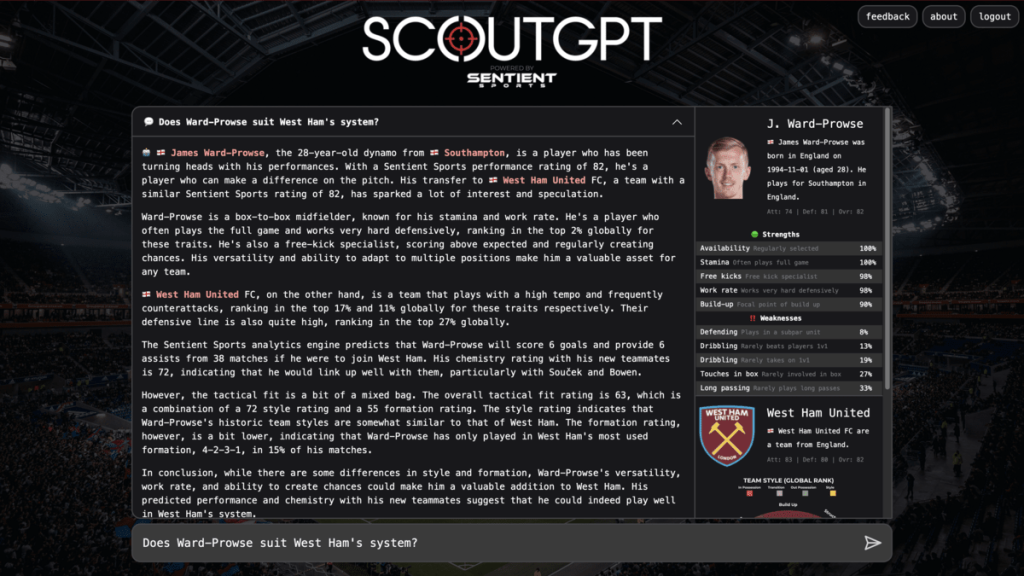The recent AI safety summit in London several weeks ago proved to be a pivotal moment for the progression of safely introducing artificial intelligence into our everyday lives, but what did the meeting of the world leaders mean for sport?
Professor Gopal Ramchurn, Chairman of SentientSports and CEO of Responsible AI UK, lent his expertise into how AI is already evolving player development and fan engagement, and the risks and concerns involved involving AI as it continues its exponential growth.
Insider Sport: Firstly Gopal, what were some of your key takeaways from the AI safety summit in London?
Gopal Ramchurn: The AI Safety Summit in Bletchley Park underscored the critical importance of addressing the challenges and opportunities presented by artificial intelligence. At the same time, the summit emphasised the central role that the UK plays in the realm of AI, positioning itself as a focal point for advancements and discussions in this rapidly evolving field.
One encouraging development highlighted during the summit was the willingness of major technology corporations to subject their AI technologies to scrutiny by regulatory bodies. This commitment to transparency and accountability is a positive step towards building trust and ensuring responsible AI development.
The establishment of safety institutes by both the UK and the US was a notable initiative discussed at the summit. These institutes are tasked with the crucial responsibility of verifying the safety and reliability of AI platforms. This collaborative effort reflects a commitment to setting standards and guidelines that promote the responsible deployment of AI technologies.
Among the urgent concerns raised, the summit underscored the paramount importance of addressing the risks associated with misinformation and disinformation facilitated by AI. Recognising this as a pressing issue, the discussions emphasised the need for proactive measures to mitigate the potential societal harms arising from the misuse of AI in disseminating misleading information.

IS: Will the Bletchley Declaration cover sports’ use of AI and if so in what capacity?
GR: While the Bletchley Declaration doesn’t explicitly delineate provisions specifically addressing the use of AI in sports, it does encompass a spectrum of concerns that have direct implications for both sports individuals and organisations.
The declaration takes into account the potential risks associated with AI, particularly in contexts that could impact the mental health of athletes and the reputation of sports entities. This extends to addressing the misuse of AI technologies, which, if unchecked, could have detrimental effects on the well-being of sports professionals and the overall brand image of sports organisations.
At the same time, the Bletchley Declaration recognises the significance of personal data in the realm of sports and emphasises the need for safeguards against its improper use. While not explicitly focused on sports, the declaration’s broader scope aims to establish principles and guidelines that indirectly influence the responsible deployment of AI in sports, promoting ethical practices and safeguarding the interests of those involved in the sporting ecosystem.
IS: How can AI be used to grow a sports club or league’s branding across the world through digital platforms?
GR: The growth of AI across various domains underscores its transformative potential, and sports is no exception. Whilst physical locations and athletes themselves will always be crucial to the sporting experience, AI platforms and untapped data are now changing the game.
One key area of this is data-driven personalisation. Generative AI will unlock value in many markets around the world by providing highly personalised content for organisations and individuals alike. By utilising AI algorithms to analyse user data, sports organisations can deliver personalised emails, targeted social media posts and customised website experiences, all of which help to create a more engaging and relevant interaction.
At the same time, clubs or leagues can leverage AI to analyse real-time data on user engagement, website traffic, and social media interactions, allowing them to adapt their digital strategies in real-time, ensuring relevance and responsiveness to global trends. Linked to this, AI-powered tools can be used to create localised marketing campaigns. By understanding cultural nuances and regional preferences, sports clubs can tailor their digital content and advertising to resonate with specific global audiences.
By leveraging AI in these ways (and many others), sports clubs and leagues can extend their reach, enhance fan engagement and build a global brand presence through digital platforms.

IS: With data and analytics more prevalent than ever before in sports, what new opportunities does AI bring forth in terms of player development?
GR: The increasing prevalence of data and analytics in sports, coupled with advancements in AI has opened up exciting opportunities for player development. It is already redefining the way athletes train, compete, and recover.
With new AI tooling, players can analyse their performance to identify strengths and weaknesses in their techniques, as well as patterns of play, decision-making, and situational awareness. This helps coaches and trainers develop highly personalised AI-powered training programs similar to tools that help you learn a language e.g., Duolingo or simply piano for music lessons.
AI has also proven to be effective when it comes to injury prevention. Wearable devices can monitor player’s biometrics in real-time. By analysing data such as heart rate, fatigue levels and biomechanics, they can help identify signs of overexertion or potential injury risks, allowing for proactive injury prevention strategies.
Added to this, Virtual Reality (VR) and Augmented Reality (AR) technologies provide immersive training experiences. Players can practise and simulate game scenarios in a controlled virtual environment, enhancing their skill and decision-making under various conditions.
But most importantly, the prevalence of AI has given sports professionals more ownership over important life and career decisions such as the next best club to go to, by providing data-driven insights, enhancing decision-making processes, and offering personalised solutions.
By leveraging AI in player development, sports teams and organisations can gain a competitive edge, enhance performance, and contribute to the overall well-being of sporting professionals.

IS: How are sports leagues and organisations also tapping into AI to help bring forth a new age of fan engagement?
GR: Perhaps one of the most important ways that AI can lend itself to sport is through the creation of global digital fanbases. Employing AI can open up a myriad of ways to optimise and monetize fan experiences, prompting a shift away from traditional physical revenue streams to open up more D2C streams.
In particular, AI can be used to analyse fan behaviour, preferences, and past interactions to deliver highly personalised content. This, coupled with real-time engagement and predictive analysis, can contribute to a better overall fan experience which will ultimately increase fans’ time spent on platforms, boosting advertisement revenues and merchandise sales.
It’s important to note that the integration of AI to drive fan engagement will take a bottom-up trajectory, with innovative and newer leagues such as TGL, a tech-infused golf league, leading the charge.
Smaller leagues, unburdened by the complexities of larger organisational structures, have the flexibility to swiftly adopt cutting-edge technologies like AI for data analytics, performance optimisation and fan engagement. In doing so, they are setting a groundbreaking precedent for larger counterparts and ultimately will inspire a broader industry shift towards embracing AI, fostering a dynamic and tech-savvy future for sports worldwide.

IS: Lastly, and thank you for your time, are there any potential risks the sports world should be aware of when using AI and its capabilities?
GR: While AI offers numerous benefits to the sports world, some potential risks and challenges should be considered and managed.
One such risk is overreliance on AI systems which may diminish the role of human intuition and expertise. Sports professionals need to use AI as a tool to enhance decision-making rather than relying solely on automated processes. Ultimately, people who use AI the most successfully will be those who know how to use it to their advantage without solely relying on it.
Similarly, the advent of AI technology brings with it the potential for significant concerns regarding the misuse of personal or copyrighted data. As AI systems rely on vast datasets to function effectively, there is an inherent risk of unauthorised access, improper handling, or exploitation of sensitive information. The indiscriminate use of personal data can lead to privacy breaches and compromise the security of individuals.
Additionally, the unauthorised incorporation of copyrighted data in AI applications raises legal and ethical issues, as it may infringe on intellectual property rights. Striking a balance between harnessing the power of AI for innovation and ensuring the responsible and ethical use of data remains a critical challenge, necessitating robust regulations and ethical frameworks to safeguard against misuse and protect the rights and privacy of individuals and content creators.
Echoing the declarations at last week’s AI Safety Summit, SentientSports is building the foundations of responsible and safe AI for the world of sports, starting with rigorous data management frameworks and supporting human decision-making with adequate safeguards.

























